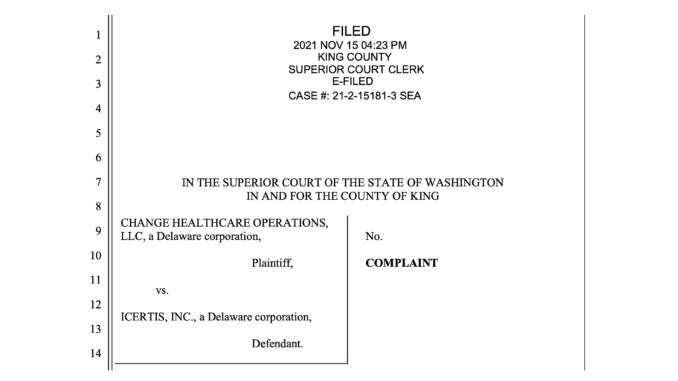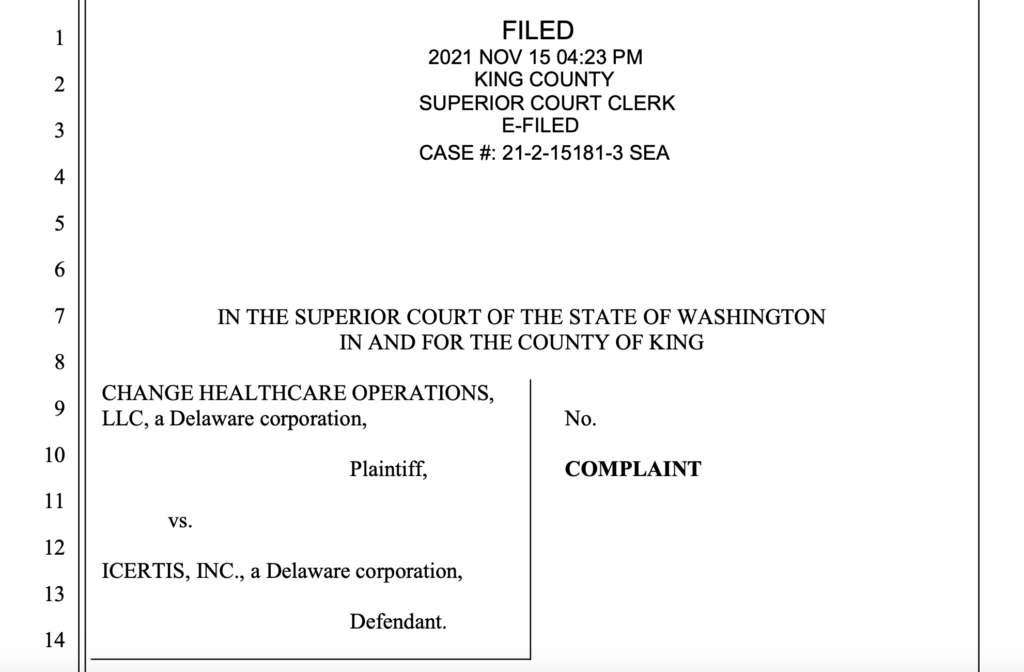
Lawyers in the US have filed a complaint against Icertis on behalf of Change Healthcare Operations LLC (CHC) over a contract management system (CMS) implementation that allegedly ‘failed’ in multiple areas.
The complaint, filed in November in King County, Washington, calls for ‘the rescission of the sale of the entire CMS Contract …. and awarding CHC damages as are necessary to place it in the same position it was in prior to entering into the CMS Contract’.
The case is a glimpse into the complexities of implementing large scale contract systems, and the lawyers for CHC at Seattle law firm Calfo Eakes give a blow-by-blow account of what is claimed happened during that process.
Below are some key parts of the complaint text, produced verbatim. Naturally, the listed allegations are just that, allegations. Icertis disputes these allegations.
Peter J Kramer, Executive Inhouse Legal Counsel, at Icertis, told Artificial Lawyer after a request for comment: ‘Icertis is committed to delivering unmatched technology and category-defining innovation through our contract intelligence platform, and we are deeply invested in our customers’ success.
‘Due to the pending litigation, Icertis cannot comment on the merits of the allegations and claims in detail. However, we dispute the allegations and characterizations set forth in the Complaint and look forward to presenting the case in court.’
Icertis is one of the most well-known CLM companies. It was founded in 2009 and has over 1,700 staff listed on LinkedIn. Earlier this year it raised $80m in fresh funding.
—

Extracts from the Complaint:
‘2021 NOV 15 04:23 PM
KING COUNTY SUPERIOR COURT CLERK
E-FILED
CASE #: 21-2-15181-3 SEA
IN THE SUPERIOR COURT OF THE STATE OF WASHINGTON IN AND FOR THE COUNTY OF KING
CHANGE HEALTHCARE OPERATIONS,
LLC, a Delaware corporation, No.
Plaintiff, COMPLAINT
vs.
ICERTIS, INC., a Delaware corporation,
Defendant.’
‘Plaintiff Change Healthcare Operations, LLC (“CHC”) alleges as follows:
This action arises out of the material breach by Icertis, Inc. (“Icertis”) of its contract with CHC following CHC’s substantial investment in reliance on a multi-year contract for a contract management system.
CHC seeks to be made whole after spending more than three million dollars purchasing and preparing for the implementation of a contract management system that has never worked and, indeed, never successfully launched.
CHC also seeks the return of money mistakenly paid to Icertis after CHC’s termination of its contract with Icertis, which Icertis refuses to return.
In June 2020, following a rigorous selection process in which Icertis represented to CHC that it was capable of performing the services CHC needed, CHC engaged Icertis to develop a contract management system (“CMS”). To that end, CHC and Icertis entered into several agreements, collectively referred to as the “CMS Contract”:
The CMS Contract was set to run for four years, by which point CHC would have paid Icertis $5,180,939.
Icertis was retained to design and implement a CMS for CHC focusing on CHC’s specific business needs. Once operational, the CMS would help automate CHC’s contract creation process, including by providing a library of approved templates and standard clauses to facilitate the standardization of CHC contracts. As a software-as-a service solution (SaaS), the CMS would facilitate the collaborative review and approval of CHC’s contracts. The CMS would further facilitate the integration of data from CHC’s contracts into other systems at CHC for tracking and other management purposes.
The CMS’s ability to apply a single contract amendment to multiple agreements simultaneously was critically important to CHC. From the outset, CHC made this need clear to Icertis and, based on Icertis’s responses to CHC’s questions during a demonstration of Icertis capabilities, Icertis fully understood CHC’s need for this functionality. Indeed, CHC would not have selected Icertis absent its supposed ability to meet CHC’s needs in this area. Icertis did not communicate its inability to accomplish this goal until long after CHC entered into the CMS Contract.
—
Implementation of the CMS was slow and, ultimately, unsuccessful. Icertis’s many failures fell into three primary categories: documentation and training, delays and confusion in implementation, and post-implementation performance.
Development of the CMS was continuously stymied by incomplete documentation and the inaccessibility of Icertis employees. Critical documentation contemplated by the CMS Contract and instruction that Icertis was to provide under the SOWs were non-existent, extremely limited, or constantly changing. These issues substantially contributed to later failures and, ultimately, prevented successful implementation of the CMS.
From the start, Icertis failed to provide (as required by SOW No. 1) two days of classroom training prior to implementation. Instead, Icertis provided three hours of live instruction and less than three days of access to an online demo. Ultimately, Icertis provided the required training only nine months after contract execution, at which point training was the least of the CMS project’s issues.
Compounding the lack of training was Icertis’s failure to provide documentation contemplated in and mandated by the SOWs. For example, Icertis failed to provide five custom and thirty standard reports, a data dictionary, and business requirements questionnaires.
…
On the whole, Icertis’s efforts regarding template harmonization were substandard and resulted in substantial rework by CHC at significant cost. Approximately 75 percent of Icertis’s deliverables needed reworking by CHC. Icertis’s struggles with harmonization resulted in nearly 1,000 hours of wasted work by CHC employees.
Icertis failed to comply with several technical obligations. Icertis failed to review contract templates and sort them into contract types, forcing CHC to do so, despite Section 3.2 of SOW No. 2 assigning these tasks to Icertis. Icertis’s template modifications were inconsistent, forcing CHC to rework them (and prompting Icertis to put a peer review process in place after repeated complaints from CHC). CHC was also forced to perform clause matching8 after Icertis’s efforts at the task were substandard, and CHC was forced to request re-work of several documents that contained, among other things, mislabeled metadata tags.
–
CHC prays for judgment against Icertis as follows:
1. An order directing the rescission of the sale of the entire CMS Contract, directing Icertis to execute all documents required to effect rescission, and awarding CHC damages as are necessary to place it in the same position it was in prior to entering into the CMS Contract and which it would have enjoyed but for the fraudulent and wrongful acts and omissions of Icertis as alleged herein, including but not limited to the return of all amounts paid by CHC to Icertis, plus interest.
2. In the alternative to rescission, an award of all damages suffered by CHC from Icertis’s breach of contract in amounts to be determined at trial, plus interest.
3. Reimbursement of the mistaken payments, totaling $1,672,032.04.
4. CHC’s fees and costs.
5. Punitive and/or exemplary damages.
6. Such other relief as the Court deems just and proper.’
—
The text above is taken verbatim from the filed complaint. As mentioned, the text shows allegations and Icertis disputes these allegations and characterisations.
4 Trackbacks / Pingbacks
Comments are closed.